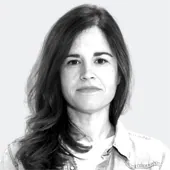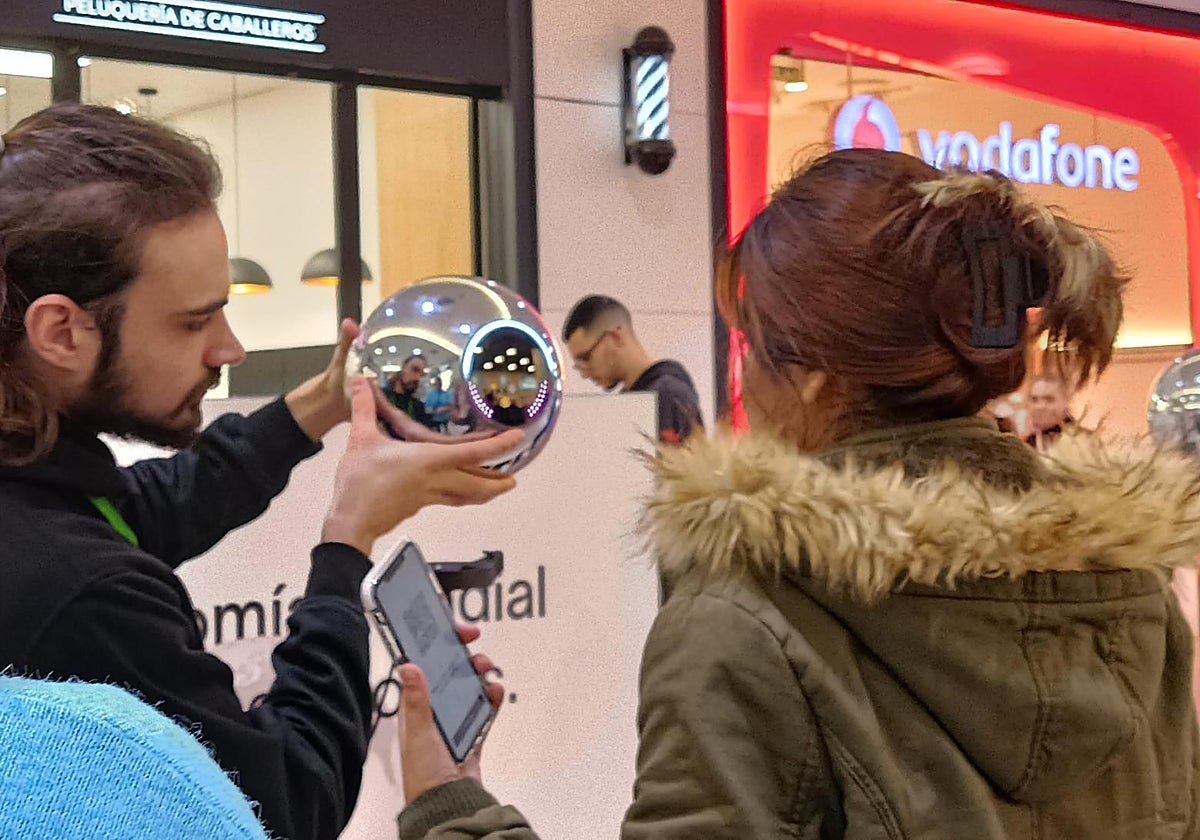The company that scans your eye in exchange for money in Malaga
Worldcoin, the most controversial project created by ChatGPT's founder, now has a stand at the city's Vialia shopping centre, which is equipped with special cameras to capture images of people's irises and offer rewards in cryptocurrency
"The world economy belongs to everyone." A simple sign with this claim, two steel spheres attached to a support that raises them to eye level and another sign saying that you must be over 18 years of age to participate is all there is. With nothing more than the machine and information, Worldcoin arrived one month ago at Malaga city's Vialia shopping centre.
It is arguably the most controversial project so far created by Sam Altman, CEO of OpenAI (the company that created ChatGPT). The Orb stand is still in the shopping centre, Orb being the name given to the cameras specifically designed to scan the iris of people who register on its World ID platform.
The very young salespeople make intriguing yet tempting offers to passers-by: they offer money (cryptocurrencies, to be exact) in exchange for joining this virtual community and having their eye photographed. Queues and crowds of curious onlookers formed at the stand in the first few days, which coincided with the lead-up to Christmas. Now that the novelty has worn off, the numbers have dropped, but the trickle of new Worldcoin users is constant.
What are the steps to register?
What are the steps to register for Worldcoin? The first thing you have to do is download the World application to your mobile phone (it is free and does not require you to enter any personal data). Then you have to find an Orb stand, such as the one in Vialia (there are already 25 in Spain), where the user's eye will be scanned and a unique and non-transferable number based on the iris pattern will be assigned through the app. This code will be used to identify the user unequivocally, both on this platform and on others with which it is integrated, such as Telegram, Reddit, Minecraft, Shopify and Mercado Libre.
There are already more than 400,000 registered users in Spain and three million worldwide. Worldcoin officially launched in July last year and its co-founders are the aforementioned Altman and Alex Blania (its CEO). Its aims are ambitious to say the least: "If successful, we believe Worldcoin could drastically increase economic opportunity, scale a reliable solution for distinguishing humans from AI online while preserving privacy, enable global democratic processes, and eventually show a potential path to AI-funded UBI (universal basic income)," its creators said in an open letter published at its launch.
The first step on this path is to solve one of the great challenges in the era of bots and artificial intelligence: to create a universal digital passport that allows each human being to be unequivocally identified, while respecting their privacy. To this end, Worldcoin has opted for biometrics and, specifically, the iris. Why? Because in this part of the eye there are lines that form a particular and complex pattern, which is different in each person and, therefore, can identify them without providing any document or personal information.
Ten Worldcoins
So the theory is full of good intentions. In practice, in order to succeed in its purpose, Worldcoin needs to reach a critical mass of identified users as soon as possible and its strategy to achieve this is not without controversy. Since its launch, the platform has been offering 'tokens' or Worldcoin coins as a reward, which are deposited in the user's virtual wallet to do what they like: spend them on websites that accept Worldcoin as a means of payment or exchange them for cash.
"The moment you complete the registration, you receive 10 'worldcoins'. After 24 hours you will receive three more and, from then on and during the first year, you will receive another three every two weeks," explains one of the Worldcoin sales representatives in Malaga. How much legal tender is this crypto-reward equivalent to? Currently, each Worldcoin token or unit is worth 2.52 euros, so after a year if this value is maintained, the reward would reach 221 euros. However, it is important to take into account the volatility of cryptocurrencies; their value can soar or plummet in a matter of days.
At the Orb stand in Vialia it is clear that most of those who come to have their irises scanned are not properly informed about what giving away biometric data might entail or how Worldcoin is going to ensure that this information does not end up in the wrong hands. Most are very young and have been attracted by videos they have seen on social media. Older people are the most wary. "They say they give free money, but it turns out it's in cryptocurrencies and I don't trust that," says 40-year-old Carlos who lives in Malaga and is unemployed, after a lengthy chat with the salesperson.
The organisation's aggressiveness in recruiting users has led it, in certain countries and at certain times, to also offer cash and gifts to people who agree to have their irises scanned. These practices, together with doubts about the protection of sensitive data such as biometric data, have generated suspicion and criticism and have led to investigations by governments in countries including Kenya, Germany, France and Argentina.
In fact, the platform has recently stopped operating in France, Brazil and India, apparently due to pressure from regulators. Furthermore, a year before its launch, the magazine MIT Technology Review published an investigation that revealed that the project had collected sensitive data from vulnerable people in developing countries in exchange for money and gifts in order to expand its user base, without these people being properly informed of the implications of giving away personal information.
The risks of having your eye scanned
What are the risks involved in handing over biometric data such as the iris pattern of the eye to a company? Vicente Ortiz, a Marbella lawyer specialising in Web3 and cryptocurrencies, offers this analysis: "It seems logical to me to be wary of sharing your iris, which is your most precious identity. Even identical twins have different irises. Handing over biometric data without knowing exactly what they are going to do with it and how they are going to protect it seems too risky to me. I haven't done it, at least not so far," he says.
There are two big questions: what Sam Altman's organisation might do with the information collected (there are, for example, doubts about whether it has used, or is using it to train artificial intelligence models) and what would happen if that information ends up in the hands of cybercriminals. "When our password is stolen we can change it, but our iris pattern cannot be changed," Ortiz adds.
Worldcoin claims on its website that the data is secure because it is "encrypted both in transit and at rest" and stresses that it does not ask users for any other personal data, apart from their iris pattern. "Individuals are not required to share their name, phone number, email address or home address. The images collected by Orb are used to generate a unique iris code. These images are immediately deleted by default once the iris code is created, unless the user agrees for their information to be stored. Opting for data to be kept will decrease the likelihood and frequency of the user needing to re-verify their ID as the iris code algorithms change," explains the organisation, which also insists that the Worldcoin Foundation "does not and will never sell anyone's personal data, including biometric data".
Whether or not to believe this declaration of intent is, to date, a question of faith, because the reality is that there is little information about Worldcoin's practices and that several countries have already launched investigations into the matter. The question is, perhaps, whether the handful of cryptocurrencies offered by the organisation outweigh the potential risks of 'selling' our irises.
Ortiz points out the irony that Sam Altman is "one of the main drivers of the breakthrough in artificial intelligence, which has created the problem of not being able to distinguish a machine from a human, and at the same time he is behind a project that 'sells' a solution to that problem". But the lawyer also finds points in favour of this project, such as the fact that its business model follows the Web3 philosophy, in which the platform's users are co-owners of the platform.
Worldcoin: company, foundation and open source
Worldcoin is not conceived as a normal company; in fact, it is not a company at all. Worldcoin is "a decentralised, open source protocol backed by a global community of developers, economists and technologists committed to broadening participation and access to the global digital economy", according to its initial statement. It is intended to become a "public network, owned by all". The platform is managed by the Worldcoin Foundation, whose mission is to "support and grow the Worldcoin community until it becomes self-sustaining". Then there is Tools for Humanity, which is a company - co-founded by Altman and Blania - and which led the initial development of Worldcoin and operates the World app.
One of the most surprising aspects of the Worldcoin project is its declared intention to contribute to the creation of a so-called Universal Basic Income: an amount that, in the future imagined by Altman and company, would be received by each and every inhabitant of the planet, and that would be financed by the enormous wealth that artificial intelligence will be generating by then.

